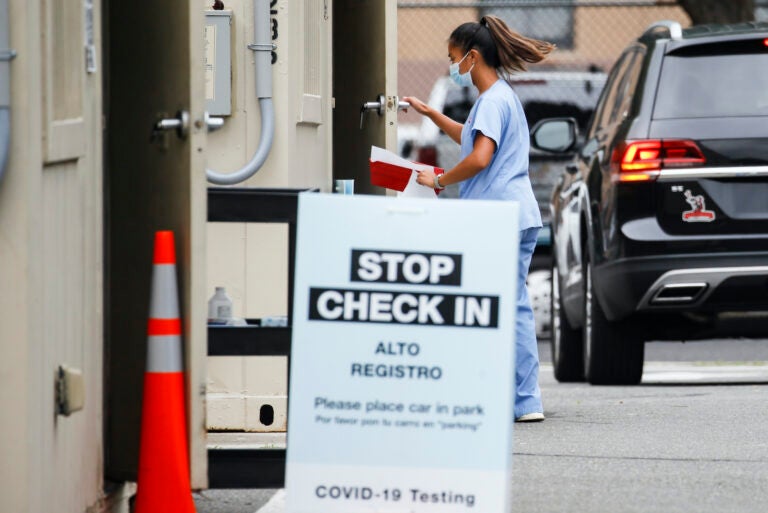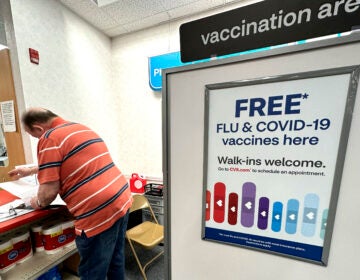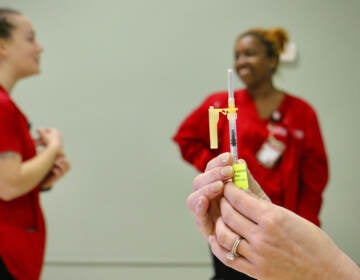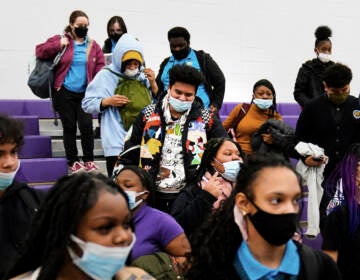N.J. coronavirus update: State revises travel advisory
New Jersey officials are urging all visitors entering the state as well as returning residents to self-quarantine for 14 days.

A medical worker collects a sample after a patient self-administered a COVID-19 nasal swab test at a Walgreens pharmacy, Friday, July 31, 2020, in Newark, N.J. (AP Photo/John Minchillo)
Ask us about COVID-19: What questions do you have about the current surge?
New Jersey reported 4,350 new cases of coronavirus Wednesday, for a cumulative total of 346,206 infections since the start of the pandemic.
Another 56 residents died from complications of COVID-19. The state has now seen 15,309 lab-confirmed fatalities and another 1,836 probable deaths.
There was a 13.68% positivity rate for PCR (nasal swab) tests taken on Saturday.
Some 3,287 coronavirus patients were in New Jersey hospitals, with 599 requiring critical care and 354 on ventilators.
State updates travel advisory
New Jersey officials are urging all visitors entering the state as well as returning residents to self-quarantine for 14 days.
It comes as the Garden State — and states across the country — continues to beat back a rising number of new COVID-19 infections, what officials have termed the “second wave” of the outbreak.
“There are very few exemptions to this advisory, including frontline healthcare workers, members of law enforcement, and active duty military personnel traveling to New Jersey on orders or directives,” said Gov. Phil Murphy, who announced the guidance on Wednesday.
The advisory does not include transient travel, such as New Jersey residents who commute to New York City or Philadelphia for work.
The state is also discouraging all non-essential out-of-state travel.
Hosplizations climb
The number of coronavirus patients in state hospitals continues to climb, and state health officials are keeping a close eye on it.
Murphy urged residents to protect themselves against the virus to avoid overloading hospitals again in what watchers hope is not a grim repeat of the spring.
“The fewer people in the hospital, the less stress and strain on our doctors and nurses, on our EMTs and other medical professionals,” Murphy said, “and the lesser chance that one of them will contract this virus and have to take themselves off the field.”
Health experts agree that they are better prepared to treat coronavirus patients now than they were six or seven months ago, but worry that a major influx of infected people would put a further strain on the system.
Murphy: No normalcy ‘anytime soon’
Murphy and state health officials are urging residents facing “pandemic fatigue” to stay the course by continuing to observe social distancing and practice good hand hygiene.
The state is now seeing daily case counts as high as — and on some days higher — than what it experienced in the spring during the height of the first wave of the pandemic.
As the weather gets colder and the holidays approach, officials worry that the numbers will continue to trend in the wrong direction.
“Everyone wants to know when this will be over — believe me, we join you in that — and when they can put their masks in a drawer and feel freer to gather again with family and friends,” Murphy said. “These numbers tell us, as least for now, not anytime soon.”
Murphy says the state could get its first doses of a coronavirus vaccine as early as late December. But since the vaccine will go to health care workers and other high-risk groups first, it could be months before everyone in the general population who wants the vaccine has access to it.

Get daily updates from WHYY News!
WHYY is your source for fact-based, in-depth journalism and information. As a nonprofit organization, we rely on financial support from readers like you. Please give today.



![CoronavirusPandemic_1024x512[1]](https://whyy.org/wp-content/uploads/2020/03/CoronavirusPandemic_1024x5121-300x150.jpg)


